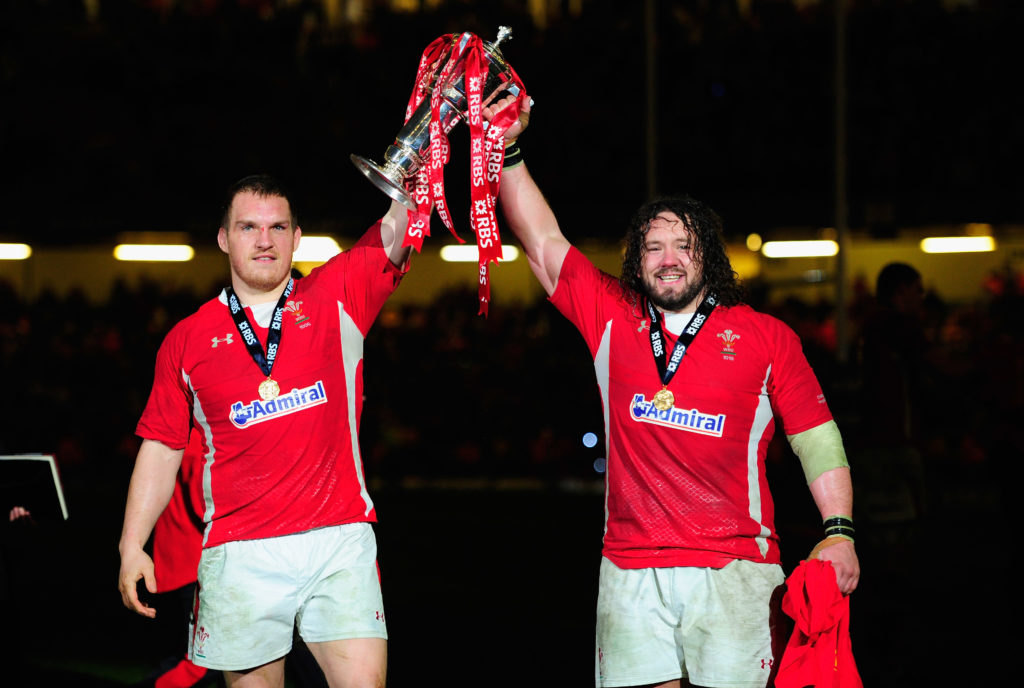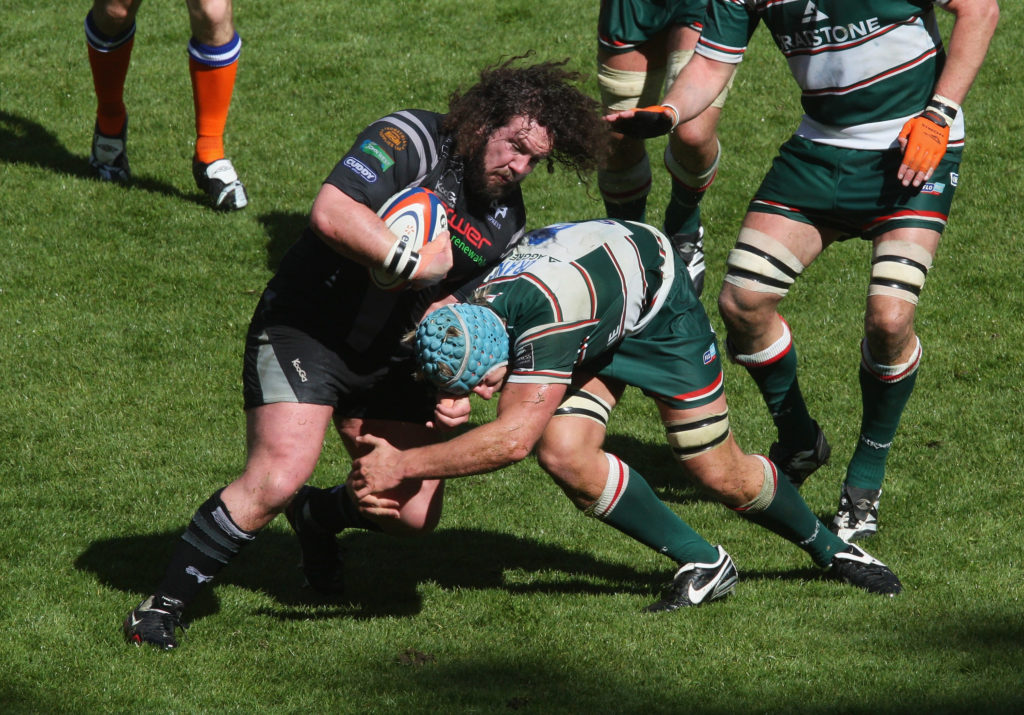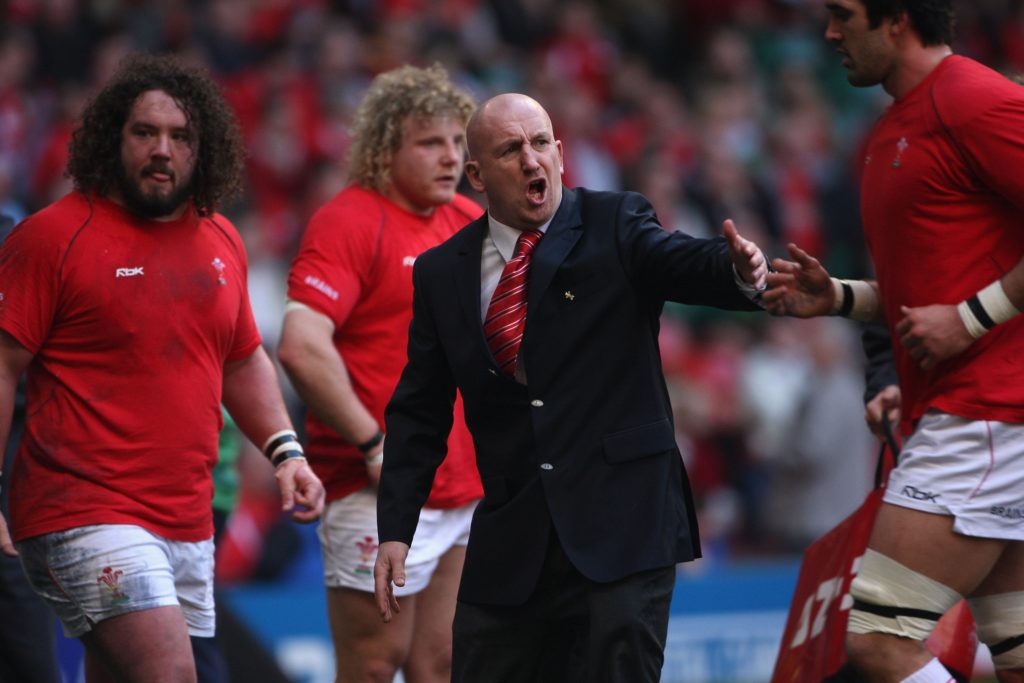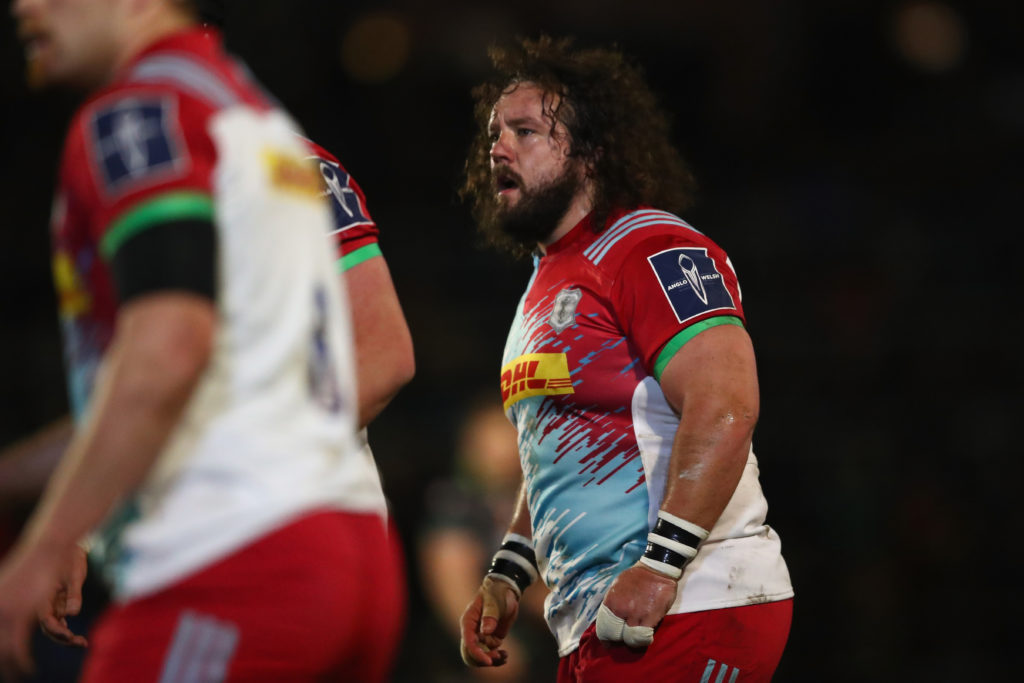By 2013, Adam Jones was such a master of his craft that he became both the immovable object and the irresistible force. His presence in the front row of a scrum was as much a source of comfort to his teammates, as one of fear to his adversaries. Before the tweaking of the laws that shortened the distance between opposing front rows, his strength, technique, and sheer size meant he almost always won ‘the hit’. The subsequent crumbling of the opposing scrum would inevitably end with a shrill blast of the referee’s whistle, and a straight arm indicating a penalty.
While Bomb is no longer at the coal face, he studies scrums with the same attention to detail a scientist would to a vaccine. Angles, body height, binds, feet position, tension, release. Elements that contribute to the perfect scrum, or foibles that can cause it to splinter and twist. While a legion of armchair Welsh fans were expressing outrage and confusion at the litany of penalties Roman Poite awarded to England last weekend, Jones was studying the intricacies invisible to the casual fan. His verdict was that while Poite was a little impatient, he was probably right.
“It was strange how early he penalised them. Unless it’s clear and obvious, I think you’ve got to reset and wait for a clearer picture to emerge. He was penalising straight away on 50/50 calls. It happened in the Ireland game as well, when Rhys Carré got pinged a couple of times for early engagement.”
Most of us who love rugby, and have played rugby, have never played in the front row. It’s a domain shrouded in mystery, and has vaguely sinister associations. We don’t know what goes on there, and don’t particularly want to. But it’s obvious what’s happening when one pack keeps it shape, drives hard and square, and forces the opposition to splinter, or collapse. What’s less obvious – and increasingly frustrating to the viewer – are the reasons behind the seemingly innumerable technical offences that can lead to penalties and free kicks. Several of those awarded against Wales on the weekend fell into that category, but Jones thinks the picture England painted early on persuaded Poite of their superior credentials.

“I think England just won the hit a few times, and it’s an easier penalty to award then if you do go down. The hit is coming back into the game, certainly here in the (Gallagher) Premiership, it’s a massive factor. Mako’s very quick out of the blocks, Kyle’s quick as well. They were into shape pretty swiftly so if Wales did flatten out or hinge, then England were seen to have won the engagement – whether it was the right or wrong call is purely the ref’s interpretation.”
Wales’ overall performance the previous week against Georgia was deemed underwhelming by a Welsh rugby public thirsty for evidence of progress, but viewed through Jones’ specialist prism, it was a source of encouragement.
“The Welsh boys scrummed so well against Georgia, who remain a very good scrummaging side. Samson was excellent and I’m a big fan of Wyn Jones. The Georgian props both play in France, where it’s a different way of scrummaging compared to international rugby. You might think a scrum’s a scrum, but they’re refereed differently. At test level, it’s more square, more technical, and it’s a height contest, whereas in France you might looking to drive up and be attacking in that way. In test matches you don’t get away with that as easily, so the way Wales scrummed against Georgia was technically excellent.”
People don’t appreciate how good a scrummager Mako is, probably because he’s so good at the other bits – his carrying, his breakdown work, his tackle count. He can do things other props can’t do.
So while some are lamenting the decline of the Welsh set piece, and questioning Jonathan Humphrey’s appointment as forwards coach, Jones has a more sanguine assessment.
“Look, that England pack is pretty good. People don’t appreciate how good a scrummager Mako is, probably because he’s so good at the other bits – his carrying, his breakdown work, his tackle count. He can do things other props can’t do, as can Kyle. They’re both incredibly powerful and explosive. Kyle’s not big for an international tight-head, but technically, he’s really good. Jamie George is a test lion, then you’ve got 125kg of Joe Launchbury, and Maro Itoje behind them, and Billy between the two of them. It’s a pretty big old pack.”
And to prove that the vagaries of international scrummaging can confound the experts as much as the layman, Jones recalls the inconsistencies he faced during one of his most memorable campaigns.
“I’ve played in many games where I’ve had the rub of the green. It’s one of those things. It’s a weird one. If I look back to 2013, we played France and I didn’t get any decisions at all on engagement. I got penalised quite heavily, and couldn’t win one for love nor money. Then in the English game, there were several 50/50s, and I won them all. It’s all on the ref and what he sees.” That England game, in case anyone had forgotten, was the one Wales won by a record margin and which delivered a second successive Six Nations trophy. The highlights reel usually consists of the two Alex Cuthbert tries played on a loop, but it was Jones and company’s merciless forward dominance that set the platform for the second half celebrations.

Jones won three Grand Slams with Wales – one of only seven Welshman with such a haul – and four Pro12 titles with the Ospreys. His forwards coach, and mentor for much of his time in ‘Ospreylia’ was a certain Jonathan Humphreys – the man Bomb credits with transforming him from a decent scrummager into a world class one. From a big man who was difficult to shift, to an explosive powerful weapon who could turn opposition loose-heads to dust. In his autobiography, Bomb, Jones remembers
“He encouraged me to use my size and bulk to smash into my opposite number, and destabilise their scrum from that first moment of contact. I used to go ‘across’ the hooker and scrummage at an angle. He wanted me to scrummage straight and square, like New Zealanders do. Humph worked tirelessly on it, poring over videos, and picking out tiny little nuances here and there to help tweak and improve things over time.”
It comes as little surprise then, to find that Jones remains an acolyte of Humphreys. He sat in on a Welsh training session before the Ireland game in March, and witnessed some positive improvements. He has little truck with those suggesting the Welsh set piece has regressed under his watch.
“The fact is, he’s working with a lot of inexperienced players. Rhys Carré, Dillon Lewis, Leon Brown – you’ve got to take a bit of pain with these young fellas. Fortunately you’ve got Samson, and Tomas Francis to fall back on, whereas in the past there hasn’t been that depth there, but the other kids are still learning their trade and are young. But Leon Brown has got Mefin Davies looking after him at the Dragons, and Dillon’s played a lot of rugby now. Carré’s been to Saracens and has come back, so this experience will start to accumulate.”
It’s all about physics – about motion and resistance. But Humph realised that teaching a fatty from Abercrave with two GCSEs about biomechanics was probably a bit over ambitious, so he simplified things.
Humphreys, Jones insists, is a “professor” of scrummaging, and while he thinks deeply, and scientifically about the game, he also has a knack of getting his message across to those less technically minded.
“It’s all about physics – about motion and resistance. But Humph realised that teaching a fatty from Abercrave with two GCSEs about biomechanics was probably a bit over ambitious, so he simplified things. He translated everything into Adam-speak. When it clicks for these boys it will click.”
Jones can see parallels between the current generation of Welsh youngsters, and the youthful front five that Humphreys shaped in his image at the Ospreys. Once the old warhorses like Brent Cockbain and Andy Newman had departed, ‘Humph’ put his faith in a bunch of local boys who quickly travelled the road from callow youngsters to teak-tough international stalwarts.
“Paul (James) and Duncan (Jones). Benny (Huw Bennett) and Hibbs (Richard Hibbard), Alun Wyn, Ian Evans, JT (Jonathan Thomas). All these guys who came through Neath and Swansea. We were all works in progress with a lot to learn, but we improved massively under his watch. He did great stuff with us, and great stuff with Scotland. I remember the Scotland-Australia game at the World Cup in 2015, when they gave them a real going over in the scrum. Because it’s not looking good at the moment, he’s going to get bagged, but believe me, he’s a world class forwards coach and that will shine through before long.”

The sympathy Jones feels towards his former mentor stems from the fact he now occupies a similar role, albeit with marginally less scrutiny. Jones is the scrum coach at Harlequins, and has come to appreciate what professional coaching involves. On a Tuesday and Wednesday, he’ll wake at 6am in his Guildford flat, to the sound of an insistent alarm bell. Within half an hour, he’ll be at the club’s training base, where he’ll remain until 6 or 7 that evening. Other days are less demanding, but it remains an all-consuming profession that requires a level of mental commitment that far outweighs anything he experienced as a player.
“You think you know a lot, then you start coaching and realise there’s a hell of a lot you don’t know. With Guzzy (Paul Gustard) at the top, there’s an obvious emphasis on defence, but getting involved in the attack has been a real eye opener. Looking at angles, dummy runners, and all the other stuff. It’s incredible to see how much detail the attack coaches go through looking for any snippet or chink in the opposition’s armour. Unless Nick Evans sees the same thing 5,6,7,8 times, he won’t pursue it. If he sees there’s a weakness, but it only happens three times, that’s not enough. He has to see it more times to prove it’s not an anomaly, but a genuine chink in the armour. So the amount of work an attack coach will do – watching as many as six of the opposition’s games to see if there’s a trait – is pretty intense.”
Geth was a freak defensively. He knew all the systems; he knew the role of a 13, a 14 , a 15 as well as his own, and he was pretty much like another coach on the field, certainly around defence.
Harlequins is proving a good place for Jones to sharpen his tools in the bosom of an experienced coaching team, and for a side whose fans are perhaps not quite as demanding of success as those who follow the Welsh national side. It’s a luxury that may not be afforded to Jones’ fellow triple-Grand-Slam winner, Gethin Jenkins, who found himself thrust into a senior role after Byron Hayward’s premature departure.
“He’s got a good rugby head on him, but it’s an astronomical step up from the Welsh Premiership and the academy to the national defence coach. Having said that, if anyone can do it he can, because the boys respect him and that’s half the battle. Geth was a freak defensively. He knew all the systems; he knew the role of a 13, a 14 , a 15 as well as his own, and he was pretty much like another coach on the field, certainly around defence. He wasn’t a coach set-piece wise, but that wasn’t at the forefront of his mind half the time. He was far more preoccupied with defence and attack.”
Welsh fans have been in full-on anguish mode about the Welsh defence in recent weeks, questioning the wisdom of letting Shaun Edwards go, and pining nostalgically for that impenetrable red wall of yore. But while arguments rage about the “system” and what’s changed, Jones contends that defence is the most fundamentally simple thing to coach.

“A lot of it is technical, and systems based; where you defend a line-out, where you put the hooker, where you put the nine, how you mix things up etcetera, but a lot of it is pure attitude. You see England now, and it’s all based around line speed. Blitz, blitz, blitz – they just keep coming and coming, and you get deeper and deeper. That’s based on commitment, heart and desire as much as anything else.”
Knowledge and respect go far in the coaching world, but delivery remains a critical skill. Knowing how to strike a balance between simplicity and complexity, persuasion and instruction.
“How you get your message across, how you deliver feedback is really important. I’d imagine he’s had to change his demeanour a lot. He was always quite dour as a player, so that would have had to change. Whether it’ll be a long term appointment, I don’t know. He’s got the spec, but not the experience, and coaching is very different to playing. But he won’t want for a lack of knowledge and expertise, that’s for sure.”
I hope they get time because they’re good people, and good coaches. My theory is that they’ll come through this and we’ll see a different sort of Welsh team in the Six Nations.
So, if defence is relatively easy to sort out, what of the attack? It’s attacking rugby that courses through Wayne Pivac’s veins, as he proved so artfully with the Scarlets. But their game plan was based around lithe, dextrous forwards being able to offload, and predatory jackallers like James Davies, Tadhg Beirne, and John Barclay snaffling turnover ball and allowing the Scarlets to strike against disorganised defences. Without similar personnel, and the luxury of time, can this method be transposed to test level? Jones thinks it can, but that patience is required.
“This time last year we were in the semi-final of a World Cup and Grand Slam champions and it’s pretty much the same group of players bar a few injuries. We’re not getting the results we want, but the long term plan to play a new style of rugby is not going to happen overnight. I love Steve (Jones). I’ve never been coached by him, but I’ve heard amazing things about him. They’re slowly bringing in these new players like Zammit, Sheedy, and Johnny Williams, who I’ve been really impressed with. It’s going to take time, but the unfortunate thing about international rugby is that you don’t get much. You’ve got to get results as soon as possible, and if you don’t the fans are allowed to get on your back. That’s the nature of the beast and rightly so. I hope they get time because they’re good people, and good coaches. My theory is that they’ll come through this and we’ll see a different sort of Welsh team in the Six Nations. I appreciate the frustrations, but you’ve got to back them to do a job.”

There are plenty who wonder if Bomb is the man who can help them do that job. Would his expertise help Wales establish the foundations they need to allow their attacking game to flourish? While he considers these overtures flattering, his future – for the next two years at least – lies in England.
“My focus is on developing English props, and that’s the big thing for me. Because I don’t play anymore, I get the buzz from watching the props I coach improve and develop. I spoke to Kyle (Sinkler) over text last night about the Wales-England game. Even though he’s left for Bristol, I still feel connected. A massive part of my coaching experience has been helping the likes of him, Joe Marler, Will Collier and these guys. Getting Simon Kerrod into the wider England squad. He’s done amazingly well, having been third choice at Worcester two years ago. That’s what I enjoy now, and the fact they’re English props doesn’t mean anything to me; I just enjoy seeing these guys get to the highest level.”
Understandable sure, but how does this passionate Welshman – the architect of so many victories over the Old Enemy down the years – feel as a spectator, when those teams lock horns.
“I always want Wales to win, but I’ve gone into games during the last four years with Kyle playing, with Joe playing, and I’d be lying if I said I didn’t want them to do well. If Wales win and the Welsh scrum gets hammered by the two props I coach, then that’s probably the perfect outcome for me.”
More from Ross Harries
If you’ve enjoyed this article, please share it with friends or on social media. We rely solely on new subscribers to fund high-quality journalism and appreciate you sharing this so we can continue to grow, produce more quality content and support our writers.


Comments
Join free and tell us what you really think!
Sign up for free